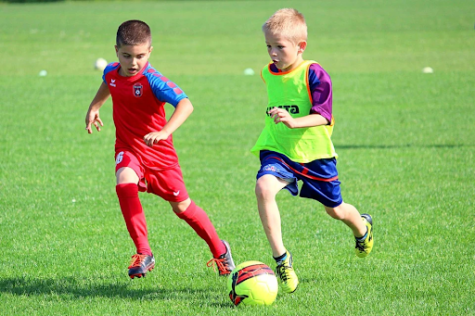
Helene MacBeth | Writer
October 21, 2021
Many children begin playing sports when they are very young, and they believe that they will continue to play throughout their entire lives, expanding their love for the sport as years go on. They could never imagine losing their passion for the sport, and think that it will be fun forever.
However, a poll by National Alliance for Youth Sports revealed that 70 percent of kids quit their sport by the age of 13. After the age of 13, kids continue to quit, causing the number of children playing sports to trend downwards as their age increases.
By thirteen years old, most kids have gotten a pretty good grasp of their sport, and typically have a high level of skill. If they are good at their sport and have so much experience, why are they quitting?
One main reason why kids stop playing their sport is because “it’s not fun anymore.” Why are sports not fun for so many teenagers? The truth is sports are no longer designed to be fun once kids reach a high level. At a certain point, the sports environment transforms from a fun one into a competitive one, where kids are constantly pushed to be the best. The mentality of “I have to be the best or I’ve failed” is adopted overtime due to the constant pressure that kids face. This is too much pressure for some kids, and even for those who are naturally inclined to seek challenges, the competitive sports mentality can be extremely detrimental.
However, on the other end of the spectrum, some kids quit their sport because it is not competitive enough. Even though most sports teams prioritize competition over fun, some teams focus more on enjoying the collaborative aspect of games. For people looking to play competitively and to win, relaxed practices seem to be a major waste of time, and quitting to find a more fulfilling pastime appears to be the best option.

Another major cause of quitting is burn out. After playing the same sport for so long, many people find themselves dreading practices. They realize that the passion they once had is no longer present. If they don’t have this love for the game anymore, why are they still playing?
Calista Pelkey, a senior at San Clemente High School, started playing water polo when she was eight years old. She became an extremely skilled player, and was the starting center defender on the varsity team. However, she recently quit because she was “over it.”“I dreaded going to practice and the games were even worse,” Pelkey said. “I didn’t feel like wasting my time on something I didn’t even enjoy.”
Others quit because of certain coaches. Brenna Geer, a junior at San Clemente High School, became a part of the 70% statistic when she quit softball at 13 years old. “I didn’t really like grown men yelling at me,” Geer said when prompted on why she quit softball. She went on to say that her coach screamed at her and her teammates constantly, and she decided that she could not tolerate it anymore. She also recognized that most of the coaches she had previously had in softball were male, and that she did not do well with men coaches. She was not able to connect or see eye-to-eye with them (especially the coach that caused her to quit), which prevented her from feeling that she was truly part of a team.
Seeing as there is only a few female sports coach at SCHS, girls in many sports aside from softball might have similar rationals for quitting.
Similar to quitting due to coaches, some quit due to certain personalities on the team. Especially in team sports, having issues with teammates can cause resentment toward the sport.
And still, others quit because of the responsibilities they have. As kids get older, their responsibilities pile up. Homework becomes much bigger of a task, school takes up more time, and jobs and community service opportunities become more available. Many find it too difficult to balance all of their activities, and decide to quit their sport to allow more hours in the day for other activities that they consider more important.
“I quit basketball my freshman year because I didn’t have enough time to play softball and do my homework,” junior Brielle Normandin said. Brielle went on to say that softball and school were her main priorities, and felt that she needed to quit basketball to focus on these things.
Others are forced to quit due to injuries. “Even though I loved volleyball, I had to quit because of my knee injury” junior Sophia Wigglesworth. Although these types of students often retain that burning passion for their sports that many quitters do not have, injuries remain one of the leading causes of quitting.
Due to the competitive nature of sports, kids often feel that they are not good enough and are filled with feelings of self-doubt. Kaelyn McCarter recognized that she enjoyed running in middle school, and joined the SCHS cross country team her freshman year. Although she went into the team thinking she was decently fast, she ended up quitting. “I didn’t feel like I was fast enough,” McCarter said. The competitiveness of cross country and the overwhelming amount of pressure that she felt caused Kaelyn to quit.
Although sports are still very populated, the amount of kids quitting is skyrocketing. Instead of ignoring the reasons that people quit sports, they need to be recognized so that improvements can be made for the future.

Leave a Reply